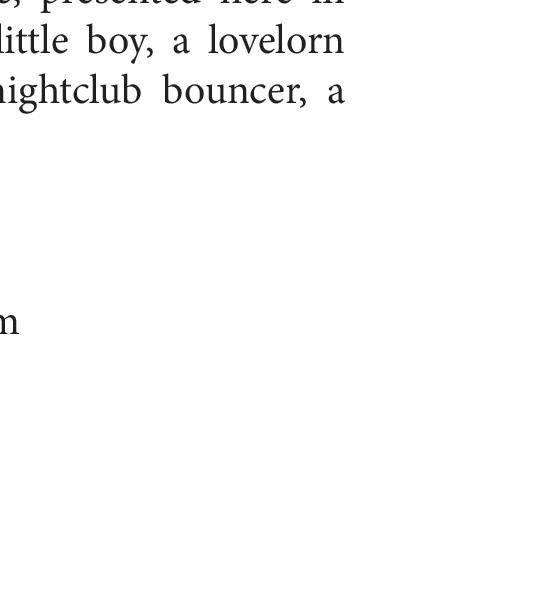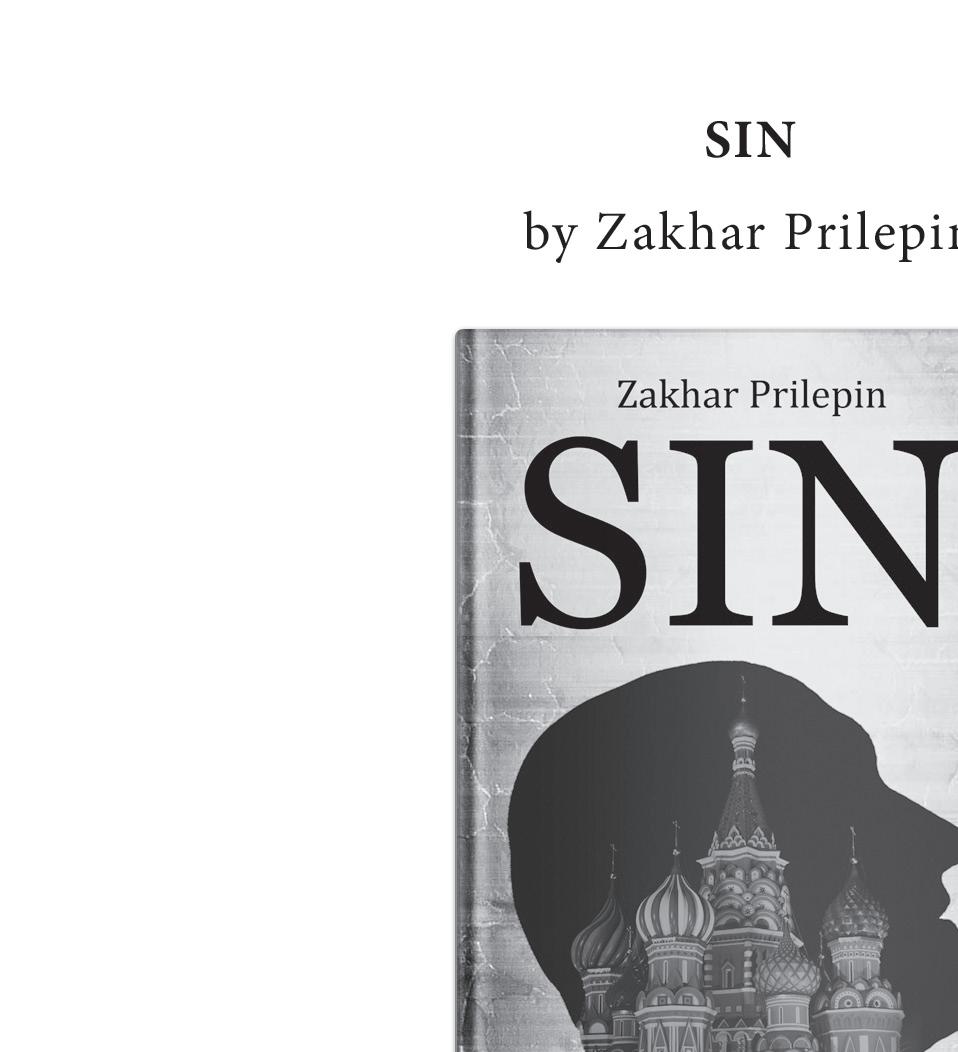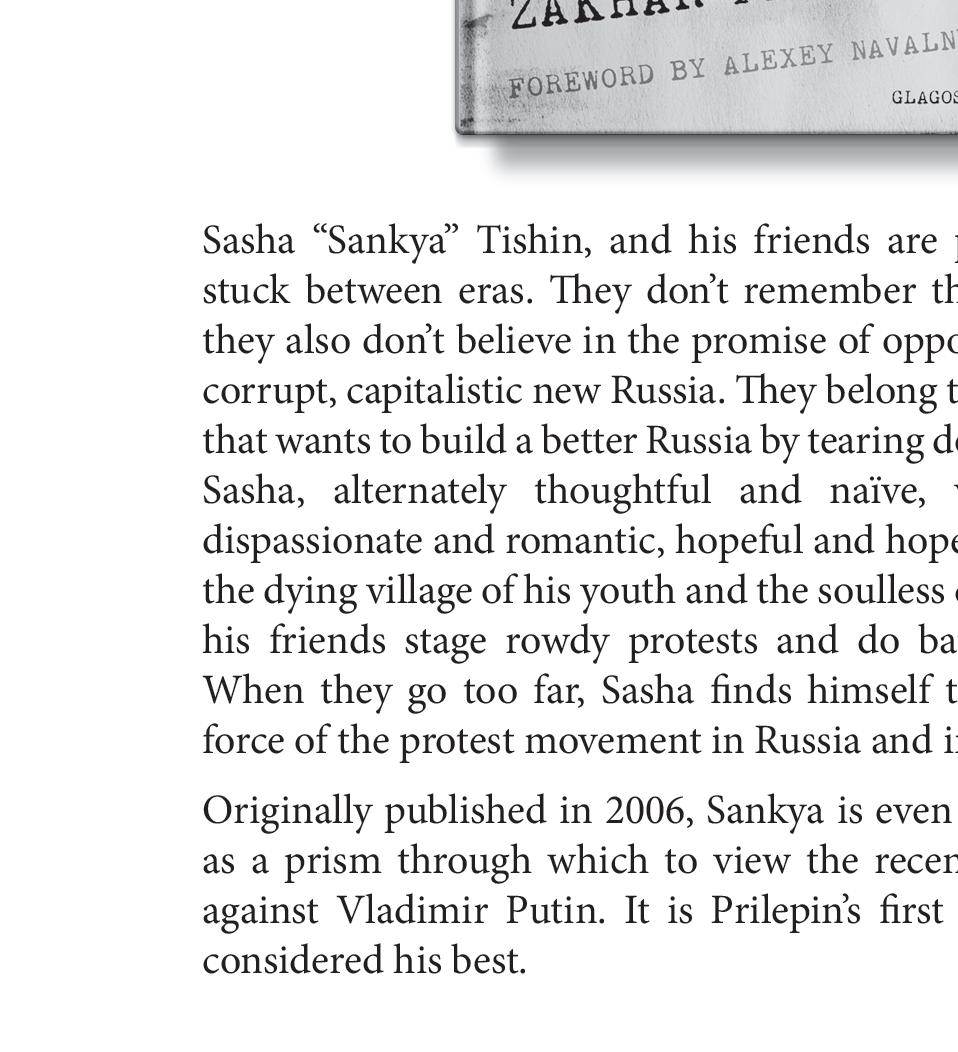
14 minute read
Book I
“Il fait froid aujourd’hui.” “Froid et humide.” “Quel sale temps, une veritable fievre.” “Une veritable peste…” 22
“You’ll recall that the monks here said, ‘In labors are we saved!’” said Vasilii Petrovich, for a moment shifting his contented, often-blinking eyes from Fiodor Ivanovich Eichmanis to Artiom. Artiom nodded for some reason, although he had no idea what they were talking about.
Advertisement
“C’est dans l’effort que se trouve notre salut?” 23 asked Eichmanis again.
“C’est bien cela!” 24 answered Vasilii Petrovich with pleasure, and so vehemently nodded his head that several berries fell to the ground from the basket he held in his hands.
“Well, I guess we’re right, then,” said Eichmanis, smiling and looking first at Vasilii Petrovich, then at Artiom, then at his companion. For that matter, she didn’t return his gaze. “I don’t know anything about salvation, but the monks knew about work.”
Artiom and Vasilii Petrovich stood on the wet grass in their dampened and dirty clothing, with black knees, sometimes shifting from one foot to the other, wiping from their faces the forest spider webs and mosquitos with hands that had ploughed the earth. Eichmanis and his woman were on horseback. He sat on a restive sorrel stallion, she was on an old piebald that seemed half-deaf.
22 “It’s cold today.” “Yes, cold and damp.” “What horrible weather. It’s like a fever!” “A real plague!”
23
24
“We’re saved by our work?” “That’s it, exactly!”
The rain began again, murky and prickly for July. An unexpectedly cold wind, even for these parts, blew in.
Eichmanis nodded to Artiom and Vasilii Petrovich. The woman silently pulled her reins to the left, seemingly irritated by something.
“Her seat is no worse than Eichmanis’s,” Artiom remarked, watching them leave.
“Yes, yes…” Vasilii Petrovich answered in a way that made it clear that he didn’t hear Artiom’s words. He put his basket on the ground and silently gathered the berries that he had dropped.
“You’re tottering from hunger,” said Artiom, looking from above at Vasilii’s cap. It wasn’t clear whether or not he was joking. “The sixth hour has chimed already. A lavish meal awaits us. What do you think? Potatoes or buckwheat today?”
A few more members of the berry brigade pulled themselves towards the road from the forest.
Without waiting for the infernal drizzle to end, Vasilii Petrovich and Artiom walked towards the monastery. Artiom limped a little. While he was gathering berries he had twisted his ankle.
He was no less tired than Vasilii Petrovich. To add insult to injury, Artiom obviously had come short, once again, of his quota.
“I won’t do this work anymore,” said Artiom quietly, oppressed by the silence. “To hell with these berries. I’ve eaten enough for a whole week, but I get no joy from it at all.”
“Yes, yes…” repeated Vasilii Petrovich once again, but he finally managed to grab a hold of himself and answered unexpectedly, “At least it was without the guards. A whole day not seeing those black hat-bands, nor those stool pigeons, nor the ‘leopards’ Artiom.”
“Plus my ration is gonna be halved, I won’t have a second portion at lunch,” parried Artiom. “Alas for my boiled cod!”
“I could always give you some of mine,” offered Vasilii Petrovich.
“Then we both won’t have met our quota.” Artiom laughed quietly. “That will hardly make me happy.”
“You know how hard it was for me to get today’s job… at least it’s not uprooting trees, Artiom.” Vasilii Petrovich grew a little more animated. “By the way, have you noticed what else isn’t in the forest?”
Artiom had noticed something for sure, but he couldn’t for the life of him understand what it was.
“Those thrice-damned seagulls don’t scream there!” Vasilii Petrovich actually stopped and, after considering, ate a single berry from his basket.
In the monastery and in the port, you could hardly walk through the clouds of seagulls, but it was the icebox for anyone who killed a seagull. The director of the camp, Eichmanis, for some reason treasured the shrieking and obnoxious breed of the Solovki gull. It didn’t make any sense.
“Bilberries have iron, chromium and copper,” Vasilii Petrovich shared his knowledge, having eaten another berry.
“For some reason I feel like I’m the bronze horseman,” said Artiom gloomily. “And the chromium horseman.”
“Besides, bilberries improve your eyesight,” said Vasilii Petrovich. “You see that star on the church?”
Artiom looked.
“So?”
“How many points does it have?” asked Vasilii Petrovich, completely seriously.
Artiom stared for a moment, then understood everything; Vasilii Petrovich saw that he understood and they both giggled.
“It’s good that you only nodded significantly but didn’t talk to Eichmanis. Your whole mouth is black with bilberries,” said Vasilii Petrovich through his laughter, then they laughed twice as hard.
While they looked at the star and laughed at what it meant, the berry brigade overtook them, and everyone considered it necessary to peek into the baskets of those already standing on the road.
Vasilii Petrovich and Artiom remained a little apart from the rest. Their laughter quickly died, with Vasilii Petrovich suddenly turning severe.
“You know, it’s a shameful, abominable trait,” he said heavily and with distaste. “It’s not enough that he just decided to have a chat with me, he even spoke to me in French! I’m immediately ready to forgive him for everything. Even to love him! I will now come and swallow that foul brew, then I will climb to my bunk to feed the lice. But he will eat meat, then they’ll bring him the berries that we gathered. And he will wash down the berries with milk! I really should, forgive me most graciously, spit in these berries. But instead I’m carrying them with gratitude for the fact that this person can speak French and condescend to my level! But my father spoke French too! And German, and English! And what cheek I gave him! How I humiliated my father! Why didn’t I give him cheek, me and my old bones? How I hate myself, Artiom! Devil take me!”
“Enough, enough, Vasilii Petrovich, stop it.” Artiom’s laugh was different now. He had managed to come to love these monologues over the past month.
“No, it’s not enough, Artiom,” said Vasilii Petrovich strictly. “Here’s what I’ve come to know. The aristocracy, it’s not the blue blood, not at all. It’s just that people ate well from generation to generation. The serf girls gathered berries for them, made their beds and washed them in the banya, then brushed their hair out with а comb. They washed off and brushed up so much that they became the aristocracy. Now we’ve been dumped in the mud, but they’ve taken the high places. They’re well fed; they’re washed; and they… well, perhaps not they, but their children… also, will become the aristocracy.”
“No,” answered Artiom and walked on, rubbing off the raindrops from his face in a frenzy.
“You don’t think so?” asked Vasilii Petrovich, catching up with him. His voice rang with an evident hope that Artiom was right. “In that case, I think I’ll eat another berry. You eat one too, Artiom. My treat. Here, even take two.”
“Forget it.” Artiom waved him off. “You don’t have any pig lard, do you?”
The closer they got to the monastery, the louder the gulls became.
The monastery was angular, with extravagant angles, untidy in its horrible ruined state.
Its body had been burned out, all that was left was moving wind and mossy boulders for walls.
It rose so heavy and huge, as though it were built not by weak mortals, but all at once, its stone body falling from the heavens whole and catching those who ended up here in a trap.
Artiom didn’t like to look at the monastery. He wanted to quickly pass through the gates and be inside.
“Already two years I’ve been scraping by here, and still, every time I enter the Kremlin, my hand itches to make the sign of the cross,” shared Vasilii Petrovich, furtively.
“Then cross yourself,” answered Artiom in a full voice.
“Towards the star?” asked Vasilii Petrovich.
“The church,” Artiom cut him off. “What difference does it make? Star, no star… The church is still standing.”
“But what if they break off my fingers? Better not anger the idiots,” said Vasilii Petrovich after a pause; he even hid his hands deeper in the sleeves of his jacket. Under his jacket he wore a shabby flannel shirt.
“… meanwhile, there’s a crowd in the church, five minutes from sainthood, filling up the three-story bunks…” Artiom said, finishing his thought. “Or even more, if you count under the bunks.”
Vasilii Petrovich always crossed the courtyard quickly with downcast eyes, as though he were trying not to accidentally attract anyone’s attention.
Old birches and lindens grew in the courtyard, even though above all of them stood poplars. Artiom especially liked the rowan tree. The inmates tore off generous bunches of berries to eat, steeped in hot water or to just chew something sour, but it turned out to be unbearably bitter. Now, only a few bunches remained on the top of the tree, and for some reason this reminded Artiom of his mother’s hairstyle. The twelfth working brigade of the Solovki camp took up the entirety of the refectory of the former cathedral church, named after the Dormition of the Most Holy Mother of God.
They walked through the wooden tambour, having greeted the orderlies — a Chechen whose name and crime he could never remember (nor did he particularly want to) and Afanasiev, whose anti-Soviet agitation, as he himself boasted, was that of a Leningrad poet. He cheerfully inquired: “How are the berries in the forest, Tioma?” The correct answer was, “The berries are located in Moscow, Mr. Deputy Head of the State Political Directorate. It’s we who are in the woods.”
Afanasiev quietly snickered, while the Chechen, it seemed to Artiom, understood nothing, but you could hardly tell from looking at him. Afanasiev sat, lounging as much as he could on the backless stool. The Chechen either walked here and there, or squatted in place.
The clock on the wall showed six forty-five.
Artiom patiently waited for Vasilii Petrovich, who, having gathered water from the barrel at the entrance, drank it, huffing and puffing. Artiom would have easily drunk the whole mug in two gulps… anyway, all totaled, he drank three whole mugs and dumped a fourth on his head.
“We have to carry that water!” grumbled the Chechen, drawing every Russian word from his mouth with some difficulty.
Artiom took a few crushed berries from his pocket and said, “Here.”
The Chechen took them, not understanding what he was being given. When he realized what it was, he rolled them down the table in disgust. Afanasiev caught each of them in turn and threw them into his mouth.
As soon as they entered the refectory, the smell that they had forgotten about after a day in the forest struck them — unwashed human filth; dirty, stale meat; no cattle smells as foul as man and the insects that live on him;







Dear Reader,
Thank you for purchasing this book.
We at Glagoslav Publications are glad to welcome you, and hope that you find our books to be a source of knowledge and inspiration.
We want to show the beauty and depth of the Slavic region to everyone looking to expand their horizon and learn something new about different cultures, different people, and we believe that with this book we have managed to do just that.
Now that you’ve got to know us, we want to get to know you. We value communication with our readers and want to hear from you! We offer several options: — Join our Book Club on Goodreads, Library Thing and Shelfari, and receive special offers and information about our giveaways; — Share your opinion about our books on Amazon, Barnes & Noble, Waterstones and other bookstores; — Join us on Facebook and Twitter for updates on our publications and news about our authors; — Visit our site www.glagoslav.com to check out our Catalogue and subscribe to our Newsletter.
Glagoslav Publications is getting ready to release a new collection and planning some interesting surprises — stay with us to find out!
Glagoslav Publications Catalogue
• The Time of Women by Elena Chizhova • Andrei Tarkovsky: The Collector of Dreams by Layla Alexander-Garrett • Andrei Tarkovsky - A Life on the Cross by Lyudmila Boyadzhieva • Sin by Zakhar Prilepin • Hardly Ever Otherwise by Maria Matios • Khatyn by Ales Adamovich • The Lost Button by Irene Rozdobudko • Christened with Crosses by Eduard Kochergin • The Vital Needs of the Dead by Igor Sakhnovsky • The Sarabande of Sara’s Band by Larysa Denysenko • A Poet and Bin Laden by Hamid Ismailov • Watching The Russians (Dutch Edition) by Maria Konyukova • Kobzar by Taras Shevchenko • The Stone Bridge by Alexander Terekhov • Moryak by Lee Mandel • King Stakh’s Wild Hunt by Uladzimir Karatkevich • The Hawks of Peace by Dmitry Rogozin • Harlequin’s Costume by Leonid Yuzefovich • Depeche Mode by Serhii Zhadan • The Grand Slam and other stories (Dutch Edition) by Leonid Andreev • METRO 2033 (Dutch Edition) by Dmitry Glukhovsky • METRO 2034 (Dutch Edition) by Dmitry Glukhovsky • A Russian Story by Eugenia Kononenko • Herstories, An Anthology of New Ukrainian Women Prose Writers • The Battle of the Sexes Russian Style by Nadezhda Ptushkina • A Book Without Photographs by Sergey Shargunov • Down Among The Fishes by Natalka Babina • disUNITY by Anatoly Kudryavitsky • Sankya by Zakhar Prilepin • Wolf Messing by Tatiana Lungin • Good Stalin by Victor Erofeyev • Solar Plexus by Rustam Ibragimbekov • Don’t Call me a Victim! by Dina Yafasova • Poetin (Dutch Edition) by Chris Hutchins and Alexander Korobko • A History of Belarus by Lubov Bazan
• Children’s Fashion of the Russian Empire by Alexander Vasiliev • Empire of Corruption - The Russian National Pastime by Vladimir Soloviev • Heroes of the 90s: People and Money. The Modern History of Russian Capitalism • Fifty Highlights from the Russian Literature (Dutch Edition) by Maarten Tengbergen • Bajesvolk (Dutch Edition) by Mikhail Khodorkovsky • Tsarina Alexandra's Diary (Dutch Edition) • Myths about Russia by Vladimir Medinskiy • Boris Yeltsin: The Decade that Shook the World by Boris Minaev • A Man Of Change: A study of the political life of Boris Yeltsin • Sberbank: The Rebirth of Russia’s Financial Giant by Evgeny Karasyuk • To Get Ukraine by Oleksandr Shyshko • Asystole by Oleg Pavlov • Gnedich by Maria Rybakova • Marina Tsvetaeva: The Essential Poetry • Multiple Personalities by Tatyana Shcherbina • The Investigator by Margarita Khemlin • The Exile by Zinaida Tulub • Leo Tolstoy: Flight from paradise by Pavel Basinsky • Moscow in the 1930 by Natalia Gromova • Laurus (Dutch edition) by Evgenij Vodolazkin • Prisoner by Anna Nemzer • The Crime of Chernobyl: The Nuclear Goulag by Wladimir Tchertkoff • Alpine Ballad by Vasil Bykau • The Complete Correspondence of Hryhory Skovoroda • The Tale of Aypi by Ak Welsapar • Selected Poems by Lydia Grigorieva • The Fantastic Worlds of Yuri Vynnychuk • The Garden of Divine Songs and Collected Poetry of Hryhory Skovoroda • Adventures in the Slavic Kitchen: A Book of Essays with Recipes • Seven Signs of the Lion by Michael M. Naydan • Forefathers’ Eve by Adam Mickiewicz • One-Two by Igor Eliseev
• Girls, be Good by Bojan Babić • Time of the Octopus by Anatoly Kucherena • The Grand Harmony by Bohdan Ihor Antonych • The Selected Lyric Poetry Of Maksym Rylsky • The Shining Light by Galymkair Mutanov • The Frontier: 28 Contemporary Ukrainian Poets - An Anthology • Acropolis: The Wawel Plays by Stanisław Wyspiański • Contours of the City by Attyla Mohylny • Conversations Before Silence: The Selected Poetry of Oles Ilchenko • The Secret History of my Sojourn in Russia by Jaroslav Hašek • Mirror Sand: An Anthology of Russian Short Poems in English Translation (A Bilingual Edition) • Maybe We’re Leaving by Jan Balaban • Death of the Snake Catcher by Ak Welsapar • A Brown Man in Russia by Vijay Menon • Hard Times by Ostap Vyshnia • The Flying Dutchman by Anatoly Kudryavitsky • Nikolai Gumilev’s Africa by Nikolai Gumilev • Combustions by Srđan Srdić • The Sonnets by Adam Mickiewicz • Dramatic Works by Zygmunt Krasiński • Four Plays by Juliusz Słowacki • Little Zinnobers by Elena Chizhova • We Are Building Capitalism! Moscow in Transition 1992-1997 • The Nuremberg Trials by Alexander Zvyagintsev • The Hemingway Game by Evgeni Grishkovets • A Flame Out at Sea by Dmitry Novikov • Jesus’ Cat by Grig • Want a Baby and Other Plays by Sergei Tretyakov • I Mikhail Bulgakov: The Life and Times by Marietta Chudakova • Leonardo’s Handwriting by Dina Rubina • A Burglar of the Better Sort by Tytus Czyżewski • The Mouseiad and other Mock Epics by Ignacy Krasicki • Ravens before Noah by Susanna Harutyunyan • Duel by Borys Antonenko-Davydovych • An English Queen and Stalingrad by Natalia Kulishenko • Point Zero by Narek Malian • Absolute Zero by Artem Chekh • Olanda by Rafał Wojasiński • Robinsons by Aram Pachyan



